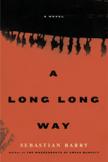Willie at War
It has been 90 years since the beginning of the Great War in 1914, longer than the time between Fort Sumter and Pearl Harbor. To write about it now is to do history, not passionate political attack of the kind Erich Maria Remarque launched in his All Quiet on the Western Front, when the war was fresh in everyone’s mind. Historians can engage in re-revisionism and argue that it was after all Germany’s fault because the General Staff wanted to test its theory that at Mobilization Day plus 30 days German troops could capture Paris regardless of what the French or the English armies might do. They almost succeeded. But by early 1915 the German military realized that it could never win the trench war and tried to persuade the political leadership to seek peace. The politicians were afraid to offend the Kaiser, however, so the long years of killing went on.
In the recent revival of interest in the war, there have appeared the wonderful French film “A Very Long Engagement,” Jeff Sharra’s To the Last Man, and now the Irish poet and novelist Sebastian Barry’s A Long Long Way. None of these works shrinks from the brutality and madness of the war. Yet precisely because they deal with the “long-ago” they are not likely to persuade Americans that similar senseless and insane brutality is now happening in Iraq. Neither did Remarque’s 1929 book halt the march to a renewal of the Great War 10 years later. Art is a poor weapon against the arrogance and insanity of political leadership and the complicity of ordinary people.
Irish readers, who are now almost as anti-American as English readers, will see a link between the fate of Private Willie Dunne of the Royal Dublin Fusiliers and the war in Iraq. Most American readers, one must fear, will not.
Willie Dunne is the 17-year-old son of the superintendent of the Dublin police, so important a “Castle Catholic” that his family actually lives in an apartment in Dublin Castle. He has a beautiful tenor voice, but, alas, at five feet six inches tall, is not a candidate for the Dublin police and hence a disappointment to his father. In part to please the father and in part because he believes his father that, if the Irish fight the Hun, the English government will finally grant home rule to Ireland, he enlists in the English army.
Willie is a pint-sized, Irish version of Billy Budd, a doomed innocent. We know from the beginning of the story that it is inevitable that he will die, perhaps just before the Armistice. In fact he is killed at the age of 21 on Oct. 3, 1918, the last survivor of his battalion of the Royal Dublins, save for his sergeant, who buries him.
In the course of the war, Willie fights at Ypres and Passchendaele, is gassed, wounded and insulted by English officers.
He shoots at the Easter Rising Dubliners while his outfit is home on leave, loses his father’s respect because he no longer trusts the promise of home rule and is betrayed by his girlfriend. He also kills a German who is about to kill him in hand-to-hand combat. He comes to believe that as someone who has fought in the English army, he will be unwelcome in the new Ireland that he reads about in the occasional paper that reaches the front. One senses that he is ready to die. “There was no road back along the way he had taken. He had no country, he was an orphan, he was alone.”
Barry leaves no doubt about the viciousness of the conflict or the stupidity of the generals and the senior English officers. Willie Dunne survives blood, mud, rain, shells, machine guns, poison gas and dysentery only to die on a quiet moonlit night while his unit is waiting to continue its pursuit of the now-retreating Germans. He hears a German soldier singing “Stille Nacht” and joins the hymn. Almost at once he is killed by a single shot. He sees four angels in the sky, but, as the narrator notes, “angels in those days were common sights.”
Barry writes with poetic power about ugliness and evil and about the tenacity of the human spirit. This is an antiwar book that ought to disturb anyone who supports foolish wars based on lies. A Long Long Way, however, suffers as a story from its foregone tragic conclusion. A young man is doomed to die, as the British novelist David Lodge has recently written, while his life is still a blank page on which nothing is written. One cannot help wondering what would have happened to Willie Dunne if he had returned to Ireland after the war. But Sebastian Barry is telling us that many innocent young men must die in war while the page of their life is still blank.
At any rate, there never again will be Royal Dublin Fusiliers, thanks be to God!
This article also appeared in print, under the headline “Willie at War,” in the April 4, 2005, issue.








